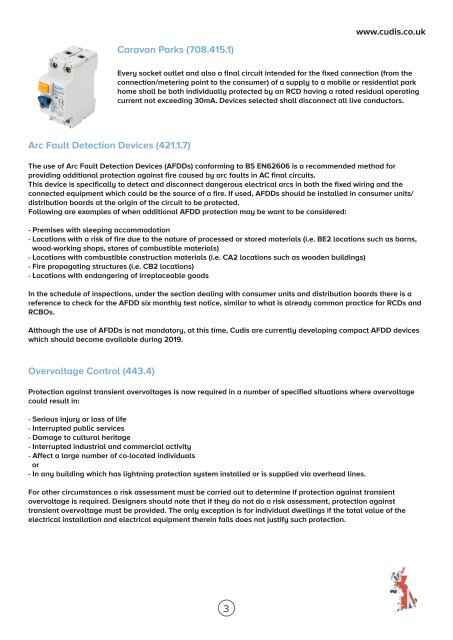18th Edition Mythbuster
Guide to the New 18th Edition Wiring Regulations
Guide to the New 18th Edition Wiring Regulations
Create successful ePaper yourself
Turn your PDF publications into a flip-book with our unique Google optimized e-Paper software.
www.cudis.co.uk<br />
Caravan Parks (708.415.1)<br />
Every socket outlet and also a final circuit intended for the fixed connection (from the<br />
connection/metering point to the consumer) of a supply to a mobile or residential park<br />
home shall be both individually protected by an RCD having a rated residual operating<br />
current not exceeding 30mA. Devices selected shall disconnect all live conductors.<br />
Arc Fault Detection Devices (421.1.7)<br />
The use of Arc Fault Detection Devices (AFDDs) conforming to BS EN62606 is a recommended method for<br />
providing additional protection against fire caused by arc faults in AC final circuits.<br />
This device is specifically to detect and disconnect dangerous electrical arcs in both the fixed wiring and the<br />
connected equipment which could be the source of a fire. If used, AFDDs should be installed in consumer units/<br />
distribution boards at the origin of the circuit to be protected.<br />
Following are examples of when additional AFDD protection may be want to be considered:<br />
- Premises with sleeping accommodation<br />
- Locations with a risk of fire due to the nature of processed or stored materials (i.e. BE2 locations such as barns,<br />
wood-working shops, stores of combustible materials)<br />
- Locations with combustible construction materials (i.e. CA2 locations such as wooden buildings)<br />
- Fire propagating structures (i.e. CB2 locations)<br />
- Locations with endangering of irreplaceable goods<br />
In the schedule of inspections, under the section dealing with consumer units and distribution boards there is a<br />
reference to check for the AFDD six monthly test notice, similar to what is already common practice for RCDs and<br />
RCBOs.<br />
Although the use of AFDDs is not mandatory, at this time, Cudis are currently developing compact AFDD devices<br />
which should become available during 2019.<br />
Overvoltage Control (443.4)<br />
Protection against transient overvoltages is now required in a number of specified situations where overvoltage<br />
could result in:<br />
- Serious injury or loss of life<br />
- Interrupted public services<br />
- Damage to cultural heritage<br />
- Interrupted industrial and commercial activity<br />
- Affect a large number of co-located individuals<br />
or<br />
- In any building which has lightning protection system installed or is supplied via overhead lines.<br />
For other circumstances a risk assessment must be carried out to determine if protection against transient<br />
overvoltage is required. Designers should note that if they do not do a risk assessment, protection against<br />
transient overvoltage must be provided. The only exception is for individual dwellings if the total value of the<br />
electrical installation and electrical equipment therein fails does not justify such protection.<br />
3


